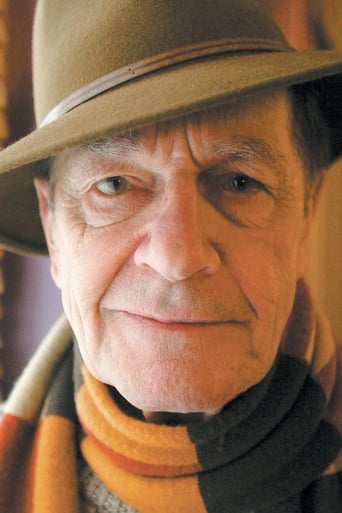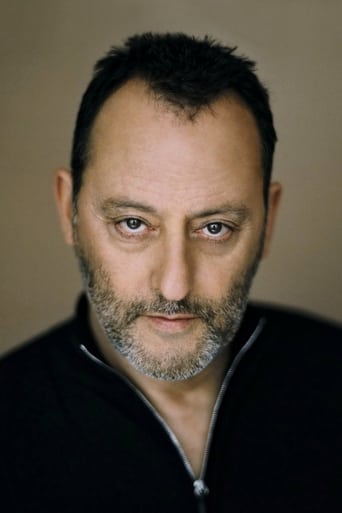NipPierce
Wow, this is a REALLY bad movie!
Colibel
Terrible acting, screenplay and direction.
Jonah Abbott
There's no way I can possibly love it entirely but I just think its ridiculously bad, but enjoyable at the same time.
Beulah Bram
A film of deceptively outspoken contemporary relevance, this is cinema at its most alert, alarming and alive.
chaos-rampant
One of the most stimulating experiences in my nightly meditation has been bestowed to me by dogs. I think we're all familiar with it, unseen dogs barking distantly into the night. You can hear them bark in groups or alone, far and close, sometimes in a chorus. The poetic notion is to imagine them secretly communicating in the mysterious way of animals. Or better yet, if one of them barks a reaction to something, say a passing vehicle, what are the rest reacting to, which they have not seen? Or are these barks nothing more than a wild gesture of participation in the collective uproar, an affirmation of existence?More importantly, what kind of view does the detached observer point in all this, who seeks patterns among the seemingly random signs? I'm not waxing here, this is what the film is about. A stratagem about six paintings (and a seventh, the stolen one), about which nothing is known except that they mysteriously caused a scandal in 19th century Paris, devised so that from behind the arcane allusions to symbols and signs, the original narrative will be extricated. The original meaning as once intended and then lost to us.The paintings come alive for us, as living tableaux. But as objects being filmed, also as cinema. Various standing figures in these enactments regard each other in mute contemplation, and all of these are regarded in turn by our narrator who walks among them to decipher their place and meaning. And then of course, us on the final end. Viewers within viewers, as in Chris Marker. Godard must have painstakingly studied this for his Histoire(s) project and other essayist works on art.So this is the fascinating stuff. All these nested narratives as fragments of cinema, potentially hiding a story of erotic intrigue in them which we attempt to surmise. Elaborate (stridently interprative) symbol theory as a device that allows us to traverse the paintings from first to last, which is rendered useless by the fact that one of them is missing. An imaginative interpretation of that missing painting as an attempt to bridge the gap and as borrowed from a third fictional source, a 19th century novel supposedly inspired by the events depicted. Nagging possibilities that the summary of the novel that purports to explain the images was in turn devised by Ruiz for the purpose of the film.Furthermore the intelligently nested remark that the artist is complicit in what he represents, on one level as the painter who sketches the members of a conspiracy, on a second as the filmmaker who makes the film about them.From these obscure allusions, finally a meaning is extracted as first principle that inspired the work here, something about the paintings representing souls yearning to be in the world again. But even that, like everything that comes before, is wearily conceded to be nothing more than fanciful conjecture, our own imprints of meaning upon a mystery of images.We might be inclined to conclude that the exercise, though stimulating, has lead nowhere. But here's the beauty of this, the paths and inroads Ruiz has charted inside the maze. Not the meaning of the image or even the image itself, but that it has been captured between two mirrors so that it reverberates forever.
OldAle1
L'Hypothèse du tableau volé/The Hypothesis of the Stolen Painting (1979) begins in the courtyard of an old, three-story Parisian apartment building. Inside, we meet The Collector, an elderly man who has apparently devoted his life to the study of the six known existing paints of an obscure Impressionist-era painter, Tonnerre. A narrator recites various epigrams about art and painting, and then engages in a dialogue with The Collector, who describes the paintings to us, shows them to us, tells us a little bit about the painter and the scandal that brought him down, and then tells us he's going to show us something....As he walks through a doorway, we enter another world, or worlds, or perhaps to stretch to the limits, other possible worlds. The Collector shows us through his apparently limitless house, including a large yard full of trees with a hill; within these confines are the 6 paintings come to life, or half-way to life as he walks us through various tableaux and describes to us the possible meanings of each painting, of the work as a whole, of a whole secret history behind the paintings, the scandal, the people in the paintings, the novel that may have inspired the paintings. And so on, and so on. Every room, every description, leads us deeper into a labyrinth, and all the while The Collector and The Narrator engage in their separate monologues, very occasionally verging into dialogue, but mostly staying separate and different.I watched this a second time, so bizarre and powerful and indescribable it was, and so challenging to think or write about. If I have a guess as to what it all adds up to, it would be a sly satire of the whole nature of artistic interpretation. An indicator might be found in two of the most amusing and inexplicable scenes are those in which The Collector poses some sexless plastic figurines -- in the second of them, he also looks at photos taken of the figurines that mirror the poses in the paintings -- then he strides through his collection, which is now partially composed of life-size versions of the figures. If we think too much about it and don't just enjoy it, it all becomes just faceless plastic....Whether I've come to any definite conclusions about "L'Hypothèse du tableau volé", or not, I can say definitely that outside of the early (and contemporaneous) works of Peter Greenaway like "A Walk Through H", I've rarely been so enthralled by something so deep, so serious, so dense....and at heart, so mischievous and fun.
Andres Salama
Having read during many years about how great this film was, how it established Ruiz among the french critics (specially the snobbish Cahiers crowd), when I finally watched it about a year ago, I found it pretty disappointing (but then, I guess my expectations were sky-high). Shot in saturated black and white, this deliberately cerebral film (made for TV, and mercifully, only an hour long) is told in the form of a conversation between an art connoisseur and an off-screen narrator as they ponder through a series of paintings (which are shown in the style of tableaux vivants) and try to find if they hold some clues about a hidden political crime. (The awful Kate Beckinsale film Uncovered has a similar argument). Borgesian is a word I read a lot in reviews about this movie, but I would say almost any Borges story is more interesting than this film.
Michael Bennett Cohn
This is a strange, cerebral, surreal, esoteric film. If there is such a thing as "intellectual horror" cinema, this film is it. I started to get scared and wish there was someone else watching it with me, and it barely has a plot! I'm going to have to see this film again multiple times before I feel I really understand it. If you're the kind of person who likes "My Dinner With Andre" and films by Godard, or if you do a lot of mind-altering drugs, you will probably enjoy this film. Wow.





